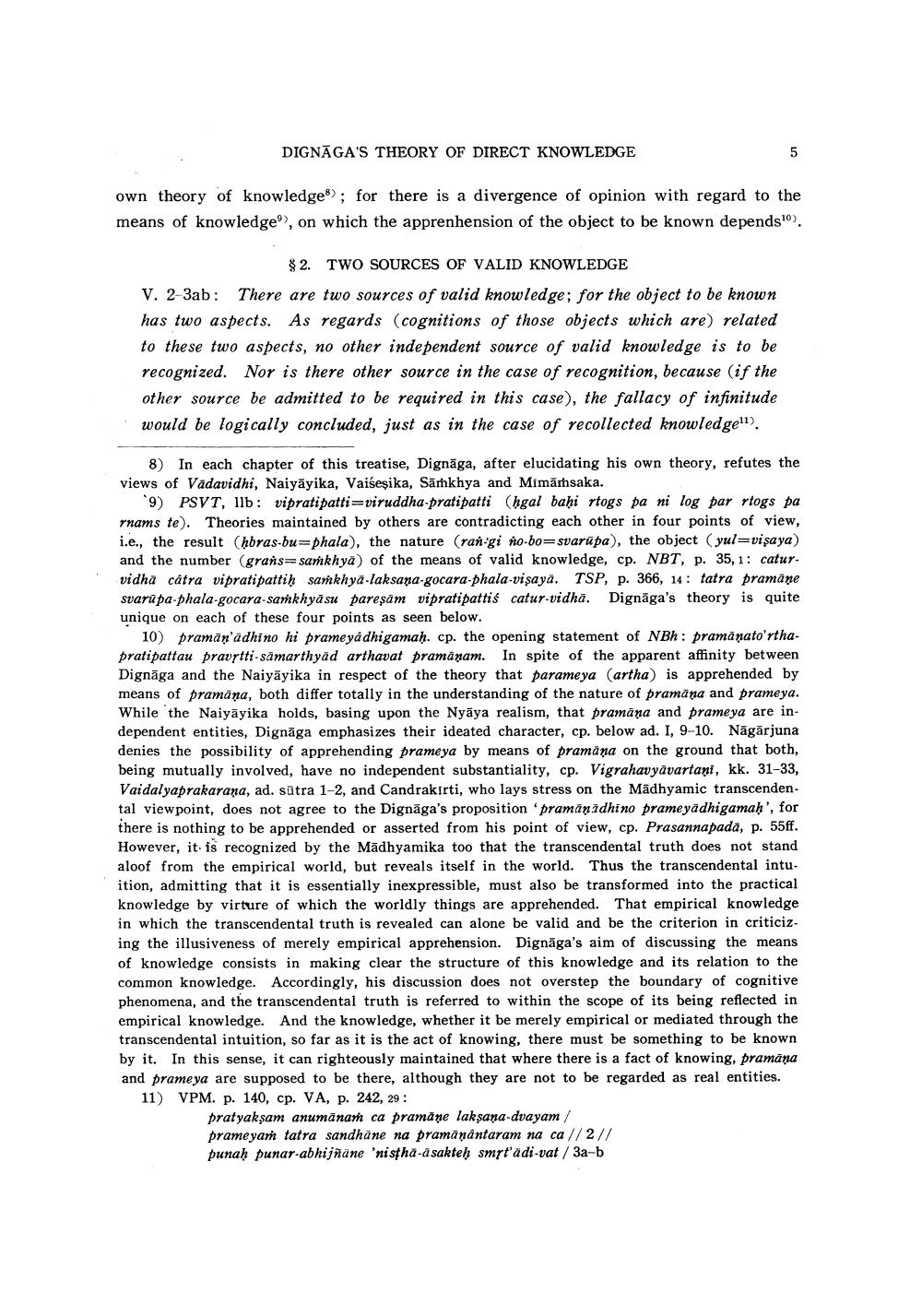Book Title: Dignagas Theory Of Direct Knowledge Author(s): Massaki Hattori Publisher: Massaki Hattori View full book textPage 5
________________ DIGNAGA'S THEORY OF DIRECT KNOWLEDGE own theory of knowledge); for there is a divergence of opinion with regard to the means of knowledge), on which the apprenhension of the object to be known depends10). 82. TWO SOURCES OF VALID KNOWLEDGE V. 2-3ab: There are two sources of valid knowledge; for the object to be known has two aspects. As regards (cognitions of those objects which are) related to these two aspects, no other independent source of valid knowledge is to be recognized. Nor is there other source in the case of recognition, because (if the other source be admitted to be required in this case), the fallacy of infinitude would be logically concluded, just as in the case of recollected knowledgell). 8) In each chapter of this treatise, Dignaga, after elucidating his own theory, refutes the views of Vadavidhi, Naiyayika, Vaisesika, Samkhya and Mimarsaka. 9) PSVT, llb: vipratipatti=viruddha-pratipatti (hgal baui rtogs pa ni log par rtogs pa rnams te). Theories maintained by others are contradicting each other in four points of view, i.e., the result (hbras-bu=phala), the nature (ran-gi no-bo=svarupa), the object (yul=visaya) and the number (grans=samkhya) of the means of valid knowledge, cp. NBT, p. 35, 1: catur. vidha catra vipratipattih samkhya-laksana-gocara-phala-visaya. TSP, p. 366, 14: tatra pramane svarupa-phala-gocara-samkhyasu paresam vipratipattis catur-vidha. Dignaga's theory is quite unique on each of these four points as seen below. 10) pramanadhino hi prame yadhigamah. cp. the opening statement of NBh: pramanato'rthapratipattau pravrtti-samarthyad arthavat pramanam. In spite of the apparent affinity between Dignaga and the Naiyayika in respect of the theory that parameya (artha) is apprehended by means of pramana, both differ totally in the understanding of the nature of pramana and prameya. While the Naiyayika holds, basing upon the Nyaya realism, that pramana and prameya are independent entities, Dignaga emphasizes their ideated character, cp. below ad. I, 9-10. Nagarjuna denies the possibility of apprehending prameya by means of pramana being mutually involved, have no independent substantiality, cp. Vigrahavyavartani, kk. 31-33, Vaidal yaprakarana, ad. sutra 1-2, and Candrakirti, who lays stress on the Madhyamic transcenden. tal viewpoint, does not agree to the Dignaga's proposition 'pramanadhino prameyadhigamah', for there is nothing to be apprehended or asserted from his point of view, cp. Prasannapada, p. 55ff. However, it is recognized by the Madhyamika too that the transcendental truth does not stand aloof from the empirical world, but reveals itself in the world. Thus the transcendental intuition, admitting that it is essentially inexpressible, must also be transformed into the practical knowledge by virture of which the worldly things are apprehended. That empirical knowledge in which the transcendental truth is revealed can alone be valid and be the criterion in criticizing the illusiveness of merely empirical apprehension. Dignaga's aim of discussing the means of knowledge consists in making clear the structure of this knowledge and its relation to the common knowledge. Accordingly, his discussion does not overstep the boundary of cognitive phenomena, and the transcendental truth is referred to within the scope of its being reflected in empirical knowledge. And the knowledge, whether it be merely empirical or mediated through the transcendental intuition, so far as it is the act of knowing, there must be something to be known by it. In this sense, it can righteously maintained that where there is a fact of knowing, pramana neya are supposed to be there, although they are not to be regarded as real entities. 11) VPM. p. 140, cp. VA, p. 242, 29: pratyaksam anumanam ca pramane laksana-dvayam / prameyam tatra sandhane na pramanantaram na ca // 2 // punah punar-abhijnane 'nistha-a sakteh smrt'adi-vat / 3a-bPage Navigation
1 ... 3 4 5 6 7 8 9 10 11 12 13 14 15 16 17 18 19 20
